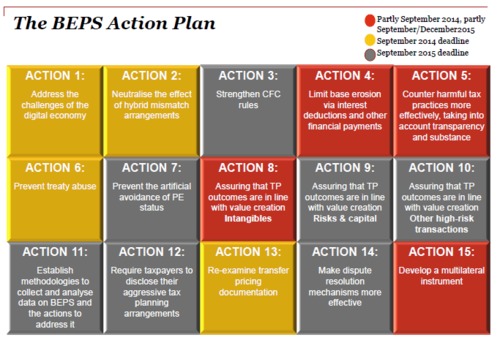
Brian Leonard
The OECD’s Base Erosion and Profit Shifting (BEPS) Action Plan is designed to enhance international consensus on various actions to refine international tax regimes. This article provides high level insights into the potential impact of BEPS on the aviation leasing industry. See the chart for the current status of individual actions.
(i) Action 6 - Preventing Treaty Abuse
The OECD has outlined proposals for counteracting the perceived abuse of tax treaties. Proposals comprised in their report dealing with Preventing Treaty Abuse include a limitation on benefits article and/or a Principal Purpose Test.
Widespread implementation of these proposals would threaten the sustainability of certain well established arrangements widely used in the leasing industry (e.g. head lease/ sublease structures). In addition, as substance is a fundamental theme of the BEPS agenda, an unintended consequence of these proposals could include increased reluctance of tax authorities to grant treaty benefits to non-standard corporate structures used in the industry.
In conjunction with Article 15 of the Action Plan, any agreed changes to treaties will be implemented via a multilateral instrument, targeted to be negotiated within 2 years commencing in early 2015. The key takeaway for the leasing industry on this point is that the OECD’s treaty-based BEPS actions may soon become a reality.
(ii) Action 7 - Prevent the artificial avoidance of PE status
The traditional thresholds for creating a permanent establishment (PE) in a country are also being reconsidered.
Global leasing companies typically have personnel in local countries engaging with airline customers. Often these personnel will agree broad contractual terms in principle with customers but are restricted by their employer from concluding contracts in that local country. The relevant OECD report provides a proposal to lower the PE threshold below that of ‘concluding contracts’. Suggestions include replacing ‘conclude contracts’ and/or ‘contracts in the name of the enterprise’ with ‘engages with specific persons in a way that results in the conclusion of contracts’ or ‘concludes contracts, or negotiates the material elements of contracts’. Consequently, activities leading to contracts would be sufficient to create a PE. This could have an adverse impact on the leasing industry and the activities of marketing/legal personnel.
(iii) Action 13 - Transfer Pricing documentation
Global related party transactions are common place in the leasing industry. Apart from head lease/sublease arrangements, related party transactions can arise in the context of funding, asset servicing, credit approval and cross guarantees. These arrangements are typically already subject to transfer pricing rules in Ireland and the counterparty jurisdiction. However, BEPS will introduce increased reporting requirements consisting of a three tier approach comprising a master file, a local file and a country-by-country (CbC) report.
CbC rules will require the ultimate parent to set out specified global data by country each year. Aside from the increased documentation burden, the availability of this information to tax authorities globally is likely to increase their scrutiny of arrangements in global leasing groups.
The OECD is viewing the 15 action points as a package of measures. This means that September 2015 should be a pivotal juncture in international tax policy development. Meanwhile, countries may unilaterally seek to implement some of the recommendations published to date (such as Ireland’s recent move on the ‘Double Irish’). Furthermore, it is likely that international tax authorities will be emboldened by the key themes emanating from the BEPS reports published to date.

